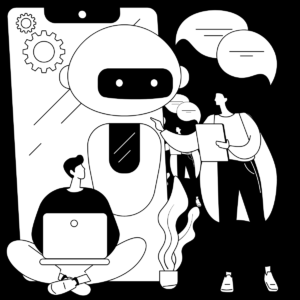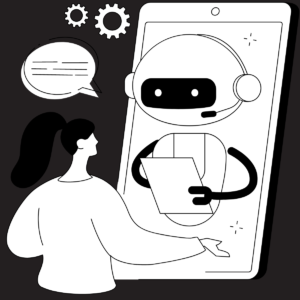Artificial Intelligence (AI), the ability of a digital computer or computer-controlled robot to perform tasks commonly associated with intelligent beings. The term is frequently applied to the project of developing systems endowed with the intellectual processes characteristic of humans, such as the ability to reason, discover meaning, generalize, or learn from past experience. (Encyclopedia Britannica )
Artificial intelligence (AI) has already become an integral part of our daily lives – chatbots greet us when we visit a website for just about any product or service and we have virtual assistants on our phones and in our homes. Even our cars are smart, and we may not even need to drive them ourselves in the not-too-distant future.  Every time we use social media, search the internet, shop, or book a trip or an event online, AI is there in the background, learning about us, making recommendations, and informing our decisions. AI is set to become more prevalent in our everyday lives and of course this will not be without some controversy and discussion around the ethics of the rise of the machines.
Every time we use social media, search the internet, shop, or book a trip or an event online, AI is there in the background, learning about us, making recommendations, and informing our decisions. AI is set to become more prevalent in our everyday lives and of course this will not be without some controversy and discussion around the ethics of the rise of the machines.
Across virtually all industries, in both public and private sectors, AI is making huge changes to the way businesses and organisations operate and how their employees, customers and even patients interact with them. AI can assist when it comes to automating repetitive tasks, streamlining customer service, enhancing human capabilities in the workplace, reducing business costs through efficiencies, and Improving cybersecurity.
2023 will see the continued rise of AI and according to IDC research spending on AI technology by governments and business worldwide will exceed $500 billion in the coming year. AI is big business that is clear, so let’s have a look at some of the key trends we can expect to see
Democratization of AI
The democratization of AI basically means making it more accessible to a wider range of businesses and business users.
 In 2023 there will be more and more simple, user-friendly AI tools and apps available. AI will become increasingly mainstream, no longer the realm of scientists and techies. AI will be affordable and accessible to businesses and organisations no matter what their size and the use cases are endless.
In 2023 there will be more and more simple, user-friendly AI tools and apps available. AI will become increasingly mainstream, no longer the realm of scientists and techies. AI will be affordable and accessible to businesses and organisations no matter what their size and the use cases are endless.
Generative AI
Generative AI is a sub-field of machine learning that involves generating new synthetic data or content based on a given set of input data. This can include generating text, images, video, code, or any other type of data.

One of the most well-known generative AI models is GPT-3, developed by OpenAI. It can create text and prose almost indistinguishable from that created by humans. A variant of GPT-3 known as DALL-E is used to create images from text descriptions.
We are talking here about AI tools and applications that can essentially mimic human creativity. It is controversial of course but in 2023 it seems likely that AI will increasingly be used to create synthetic data that can be used by businesses for just about anything.
Ethical AI
2023 will likely see debate around the many ethical issues that go hand in hand with the use of AI.The issue of trust is huge. AI feeds on our data, it learns from it and makes decisions based on it, but that data is private, personal, and sensitive and we naturally struggle to trust machines to make what are essentially human decisions.
The development of more ethical and understandable AI systems is paramount if the technology is to be accepted more widely. Organisations that adopt the use of AI will need to eliminate bias and unfairness from their automated decision-making systems. You simply can’t have AI systems that discriminate or make unfair decisions about people’s health, wealth, or freedom.
Augmented Working

In 2023, it will become increasingly likely that we find ourselves working alongside robots or smart machines to help us do our jobs more efficiently. This may take the form of AI-powered virtual assistants, Smart handsets, Augmented Reality (AR) headsets, or AI generated dashboards and reporting tools. We are arguably being enhanced rather than replaced by the machines at this stage but it may not always feel that way. The benefits to business of AI in certain areas is undeniable but the challenges of integrating it into the workplace are very real.
Sustainable AI
In 2023 carbon footprint and environmental impact will continue to be key areas of focus for all businesses and AI will have a role to play.
 The use of AI tools and applications brings with it certain challenges. On the less positive side of the sustainability equation AI algorithms and the infrastructure needed to support and deliver them, such as cloud networks and edge devices can potentially necessitate an increased use of power and resources but equally the technology has the potential to help companies work in a more energy-efficient way by highlighting areas where there is waste and inefficiency in business operations and processes. AI is in many areas leading the way to business becoming greener and more sustainable.
The use of AI tools and applications brings with it certain challenges. On the less positive side of the sustainability equation AI algorithms and the infrastructure needed to support and deliver them, such as cloud networks and edge devices can potentially necessitate an increased use of power and resources but equally the technology has the potential to help companies work in a more energy-efficient way by highlighting areas where there is waste and inefficiency in business operations and processes. AI is in many areas leading the way to business becoming greener and more sustainable.
AI is not purely being used to increase corporate profits. Its use is proving to be a force for good in the fight against some of the biggest environmental problems facing our planet. AI tools are being used alongside existing technologies to help identify and combat threats such as deforestation, illegal logging fishing and poaching and climate change – hopefully this is a trend that grows and grows in 2023.

